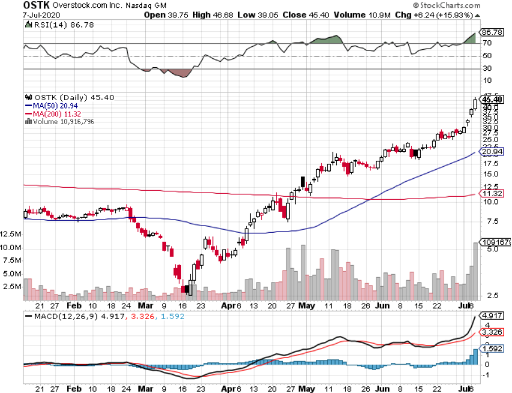The Only Retail Play You Want to Know
As U.S. virus cases explode, the shelter-in-home trade is back in full force, meaning investors need to look at Overstock.com, Inc. (OSTK).
We are talking about parabolic action in a stock price with shares up 16% yesterday alone and even doubling in the last 40 days.
The U.S. is now hugging that 50,000 cases per day mark and it is only a matter of time until the health crisis spirals so far out of control that everybody will be back inside online shopping again on their touchpads.
And if it doesn’t get that bad, it certainly will trend in that direction which is why Overstock.com will be back in vogue.
The short-term performance validates my thesis that Overstock.com is going through a renaissance as it goes from the edge of the periphery to a tech darling.
Revenue in April and May were up 120% year-over-year as the company expects to see continued momentum in the near-term, Overstock CEO Jonathan Johnson remarked during a Fox Business interview.
Consumers "still aren't ready" to return to furnishing stores to test couches, beds, and other furniture due to the coronavirus pandemic, Johnson said. The online venue clearly remains "the place" to buy home furnishing items.
Overstock.com wholeheartedly believes they will experience "strong" double-digit growth rate through the summer.
The mother of all tailwinds has legs and you might think of Overstock as a smaller e-commerce store in the mold of Amazon.com, but they have really taken the business model up a notch.
Overstock started out as a pure play on online retail operations, based on a low-cost business model that involves the selling of excess inventory from factories and other retailers at discounted prices.
Overstock.com Inc. became a household name as an e-commerce pioneer, but in recent years, excitement in the investment community was focused more on the company’s blockchain efforts.
The pandemic changed the world and the company is dusting off its e-commerce playbook.
Mushrooming sales at Overstock’s retail business have helped transform a timid stock to one of the Covid-era’s best performers, an irony for a division that had long been considered for sale.
Overstock shares have gained nearly 11-fold since closing at a record low on March 16, and this is just the beginning as the administration hopes to convince the population that the virus doesn’t need any managing.
Sweeping the carnage of the virus under the carpet makes no sense, and with the internet disseminating information and disinformation, will Americans be inclined to believe the virus has no teeth?
It’s hard to wrap our heads around the US government’s response to a global health crisis and the bountiful harvest the tech sector is collecting.
They hardly needed it.
Tech was crushing it before the pandemic.
If you strip out the earnings of the Big 6 of Facebook, Amazon, Apple, Microsoft, Netflix, and Google, there is no earnings growth for the last five years in any sector.
Stocks went up purely based on excess liquidity and a monstrous corporate tax break.
Then the administration’s disregard of the health crisis gifted accelerating revenue to the tech sector while every other sector was cruelly pillaged.
Granted, the U.S. administration had no intention to hammer non-tech businesses, but that is exactly what is playing out.
So now this is what you get – a once sluggish tech stock like Overstock.com turning into an e-commerce pandemic play on steroids overnight.
The stock is frantically gapping up almost every day and it was just a few years ago when the company was really grasping at straws by jumping on the cryptocurrency bandwagon.
The U-turn by CEO Jonathan Johnson says it all as he has “no interest” in selling the e-commerce business which he was desperate to sell last month.
And just based on the news that Johnson didn’t sell the e-commerce unit last month, the stock doubled.
It’s unfathomable times in the tech sector.
The decor and home improvement market could end up benefiting from a total of $200 billion in an annual tailwind because of the pandemic’s effect on consumers.
If consumers are looking for a similar e-commerce play, then Wayfair (W) should fit the bill.
It’s getting to the point where if the late first wave or early second wave hits harder than the initial wave in March, there might be nowhere else to buy home furnishings and décor but at e-commerce stores.
I am bullish Overstock.com


